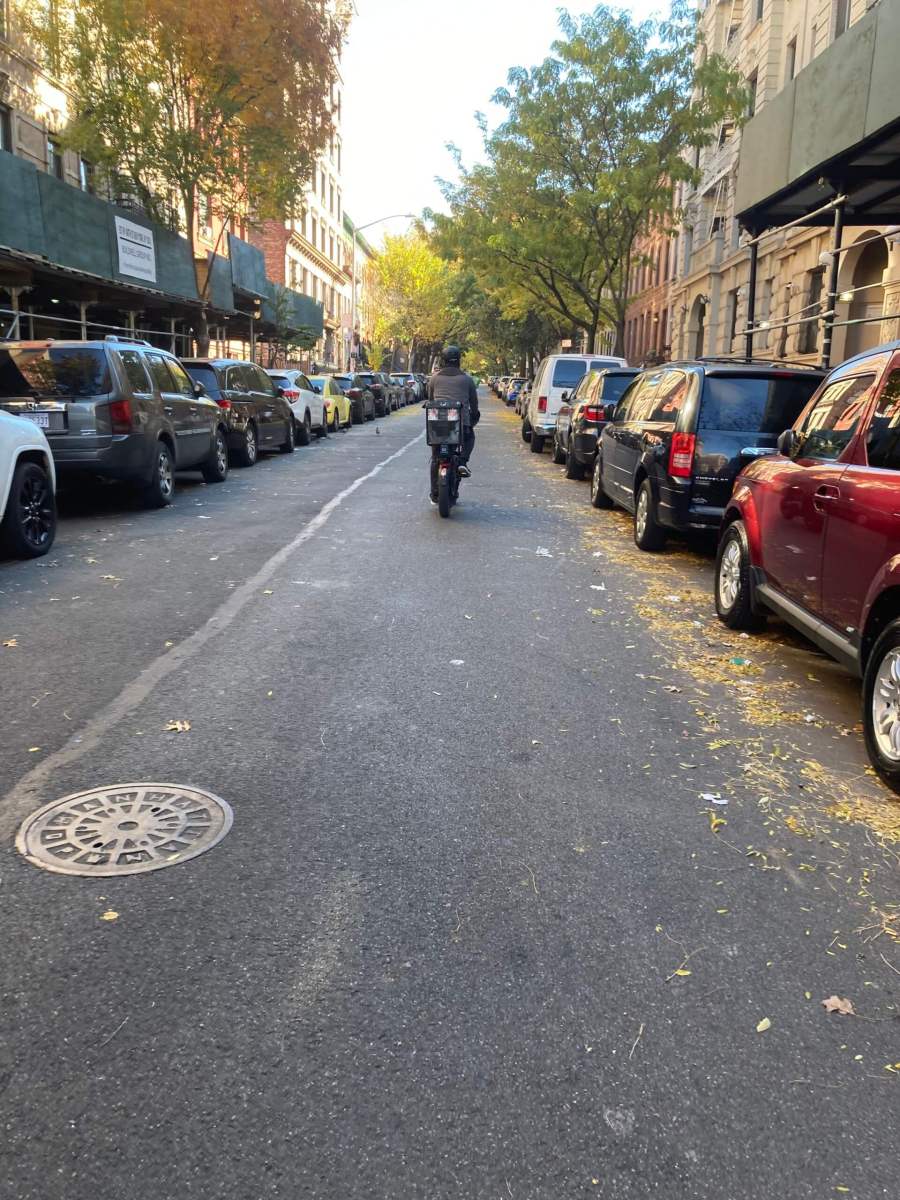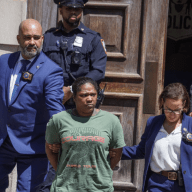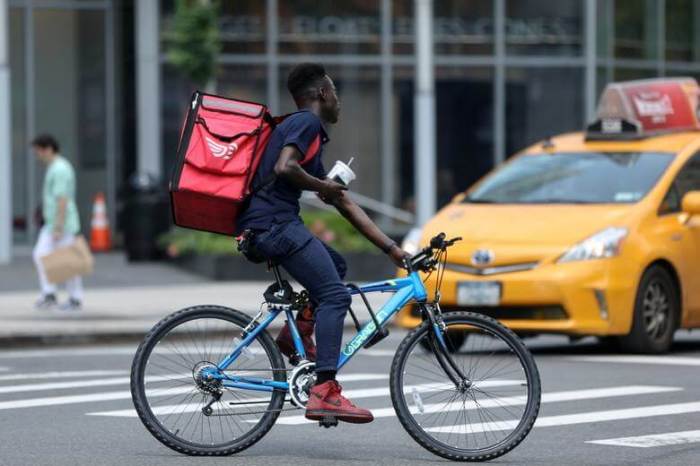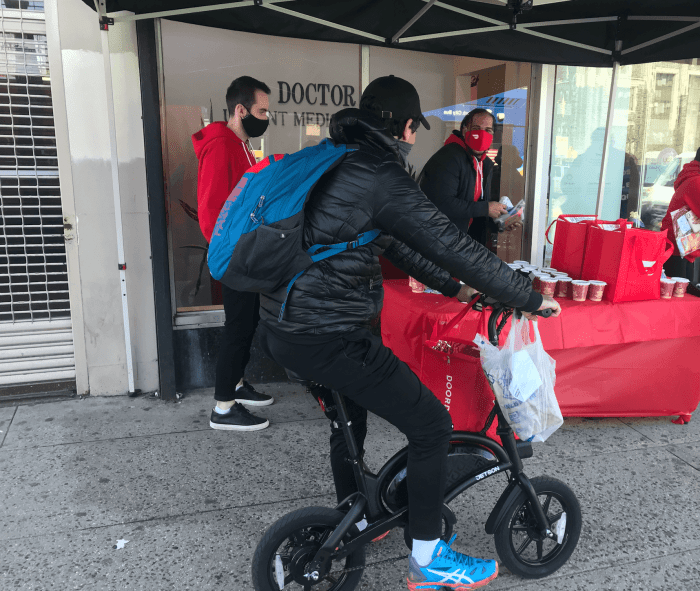Since December 2020, more than 20 NYC food couriers have lost their lives during delivery stops. On two occasions this year, Manny Ramirez, a food courier from the Bronx, found himself in a hospital bed doing a job he loves.
On Jan. 14, Ramirez, who commutes through the boroughs on his bicycle, was hit by car at an intersection, which led to a four-month stay at the hospital. On Sept. 29, Ramirez was hit by another car turning into an intersection causing damage to his left arm.
Roughly 54% of NYC food couriers who were surveyed in a Los Deliveristas/ Workers Justice Project-Cornell report said they were victims of bike theft, and about 30% said that they were physically assaulted during the robbery.
“I’ve had two accidents and a violent assault, and another attempted assault,” Ramirez said. “On top of this, on two occasions I’ve had a client give me fake bills. Plus, there is bicycle theft and the lack of bike lanes in the city.”
Couriers often find themselves on the hook when things go awry, even if they’re not at fault. A whopping 49% of respondents reported having been in a collision while on the job, and 75% of those respondents said they had to pay for their medical care out of their own pocket.
“In both assaults I was very fortunate to not end up with a bad cut,” Ramirez said. “In the more than five years that I’ve worked as a delivery driver, none of the companies I’ve worked for have contacted me to offer any help.”
The stories of NYC-based delivery drivers, many who have detailed a working experience that includes long trips with little rest, low pay and in some cases, injury and death led to one of the most ambitious bills to pass the New York City Council last month.
A package of bills — awaiting signature from either Democratic Mayor Bill de Blasio or his successor Eric Adams, a Democrat who takes office on Jan. 1, 2022 — aims to provide delivery workers’ access to bathrooms in restaurants, trip distance limits, protection from unfair banking fees, reimbursement for insulated bags, and, most importantly, establishing a minimum pay.
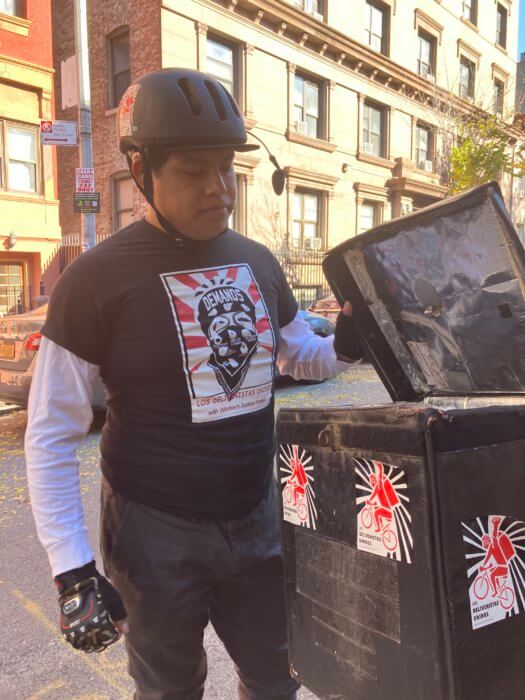
The legislation was written in collaboration with Los Deliveristas Unidos, a collective of mostly immigrant app delivery workers who have long pushed for living wages, bathroom access and the right to organize. In the Workers Justice Project report, 83% of couriers surveyed reported that they have been denied use of a bathroom at restaurants.
In a separate survey of roughly 500 NYC-based delivery drivers, respondents said their concerns revolved around low pay and dangerous work conditions.
According to the Workers Justice Project report, the estimated delivery workers’ net revenues are $2,345 per month, including tips. For a delivery driver who works six days or more per week — 85% of delivery workers surveyed that this is their main source of income — the hourly net pay, with tips included, is around $12.21.
“You earn it by picking up the food and taking it to the client,” an excerpt from the report reads. “Every trip has a different payout, depending on what the company decides to give the rider, and what the client gives as a tip. In a workday of 8 to 10 hours, it’s around 90 dollars without tips, with estimates (of) 15-20 orders.”
Los Deliveristas/ Workers Justice Project points out that, if you exclude tips — which account for 44% of a couriers’ earnings and a highly unstable and variable form of income — the average net pay of app-based delivery workers amounts to $7.87.
“My job was to deliver a little bit of tranquility as they were being exposed as little as possible to the virus. In this year that is about to end, and part of the past year is when I’ve made the least amount on tips, but without a doubt I feel the most satisfied that I’ve ever felt,” Ramirez said. “We receive calls from people killed doing what I do, delivery drivers, who go out to work like me, and it makes me think of the void that remains in these families who lose a loved one who was just trying to work.”
Another complaint, expressed by delivery drivers and food couriers, are third-party app’s algorithmic management that is impacting their ability to get work.
Apps like Door Dash and Uber Eats rely on a workers’ acceptance of orders and consumer ratings, couriers say. However, if workers reject too many orders or if they receive low ratings from consumers, they face lower ranking with the apps, fewer or less favorable time slots to connect with the apps, and even deactivation of their accounts.
A spokesperson with DoorDash told the Bronx Times that delivery drivers, otherwise known as Dashers, are never deactivated for declining orders and are able to decline as many orders as they choose.
“This is why last year, we announced an industry-leading set of initiatives to improve Dasher safety, strengthen earnings, and expand access to restrooms. We will continue to work with all stakeholders, including the City Council, to identify ways to support all delivery workers in New York City,” a DoorDash spokesperson said.
The spokesperson also said that Dashers can decline any order and the company removes ratings under 5 stars when the reason was out of the Dasher’s control, and that Dashers are eligible for federal occupational accident insurance coverage.
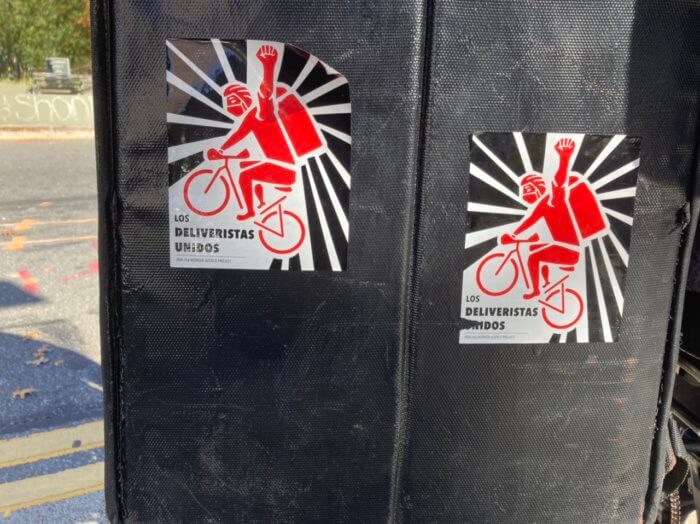
Hildalyn Colon Hernandez, director of Policy and Strategic Partnerships at the Workers Justice Project, said that the work done to improve working conditions for New York City delivery workers is the first step in hopefully setting an example nationwide.
“This city can set an example for how we treat the hard-working men and women who deliver your food through storms, during a pandemic and through all circumstances, with basic respect and dignity,” she said. “There’s still more work to be done but we’re proud of the progress we’ve made in NYC.”
Reach Robbie Sequeira at rsequeira@schnepsmedia.com or (718) 260-4599. For more coverage, follow us on Twitter, Facebook and Instagram @bronxtimes.

